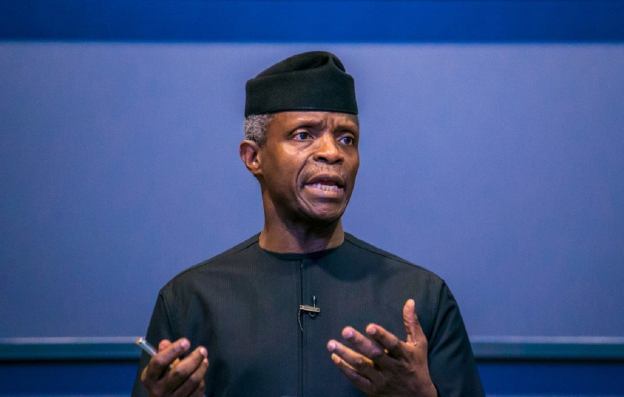COVID-19 has magnified educational inequity in Nigeria – Osinbajo
…says education system should be driven by innovative tech Vice President Professor Yemi Osinbajo said COVID-19 has magnified the educational inequity in Nigeria as only those with access to digital learning resources will keep learning in the comfort of their homes while those without (the majority) are left behind. He said the school narrowed the […]

Vice President Yemi Osinbajo
…says education system should be driven by innovative tech
Vice President Professor Yemi Osinbajo said COVID-19 has magnified the educational inequity in Nigeria as only those with access to digital learning resources will keep learning in the comfort of their homes while those without (the majority) are left behind.
He said the school narrowed the gap for students during school sessions, “but when learning has to take place at home during a pandemic, inequalities in society are clearly revealed.”
The vice president stated this at the 2020 Nigeria Annual Education Conference (NAEC) with the theme ‘Building an Effective, Resilient and Sustainable Education System for Nigeria during and Post COVID-19 Pandemic: The Way Forward’.
Osinbajo said: “Nevertheless, the perceived gaps indicate the need to think deeply about how we can sustain digital transformation in Nigerian schools.”
Represented by the Minister of State for Education, Chukwuemeka Nwajiuba, the VP said worldwide, countries are embracing technological innovations to cushion the effects of the pandemic.
He maintained that the COVID-19 pandemic has shown that the Nigerian education system should be driven by innovative educational technology for both learning and teaching for Nigerian children to be globally competitive.
He therefore said there is an urgent need to design and develop suitable curriculum, assessments and monitoring systems that focus on improving the quality of education through the alignment of the curriculum to existing and projected education needs, revising current assessment methods and reinforcing systems that support the effective monitoring of the education sector in post-COVID-19 pandemic.
“It is glaring that adaption of the current curriculum to facilitate learning in hybrid schooling situations needs to be actualised in view of the unexpected disruption of the education system by the COVID-19 pandemic,” he added.
While noting that the possibilities of designing Science, Technology, Engineering and Mathematics curricula such that they can be taught virtually should be worked out by appropriate government offices and stakeholders, Osinbajo said appropriate learning assessments methods and digital monitoring/evaluation programmes must be designed to drive the digital curriculum that would be developed.
Earlier, the Minister of Education, Malam Adamu Adamu, represented by the permanent secretary, Architect Sunny Echono, said the ministry will continue to look into how to deploy technologies in education to ensure that online education becomes an integral component of school education.
“The abrupt school closure due to COVID-19 made some teachers in the country deliver online learning without proper training, support or preparation. They had to digitise their course contents and/or develop new contents. This development calls for immediate response to ensure such gaps do not occur again,” he stated.
Adamu said the anticipated technology will strengthen the inclusive and alternative education of marginalised and disadvantaged groups by accessing learning in a new way.
